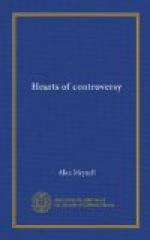If I may define my own devotion to Dickens, it may be stated as chiefly, though not wholly, admiration of his humour, his dramatic tragedy, and his watchfulness over inanimate things and landscape. Passages of his books that are ranged otherwise than under those characters often leave me out of the range of their appeal or else definitely offend me. And this is not for the customary reason—that Dickens could not draw a gentleman, that Dickens could not draw a lady. It matters little whether he could or not. But as a fact he did draw a gentleman, and drew him excellently well, in Cousin Feenix, as Mr. Chesterton has decided. The question of the lady we may waive; if it is difficult to prove a negative, it is difficult also to present one; and to the making, or producing, or liberating, or detaching, or exalting, of the character of a lady there enter many negatives; and Dickens was an obvious and a positive man. Esther Summerson is a lady, but she is so much besides that her ladyhood does not detach itself from her sainthood and her angelhood, so as to be conspicuous—if, indeed, conspicuousness may be properly predicated of the quality of a lady. It is a conventional saying that sainthood and angelhood include the quality of a lady, but that saying is not true; a lady has a great number of negatives all her own, and also some things positive that are not at all included in goodness. However this may be—and it is not important—Dickens, the genial Dickens, makes savage sport of women. Such a company of envious dames and damsels cannot be found among the persons of the satirist Thackeray. Kate Nickleby’s beauty brings upon her at first sight the enmity of her workshop companions; in the innocent pages of “Pickwick” the aunt is jealous of the niece, and the niece retorts by wounding the vanity of the aunt as keenly as she may; and so forth through early books and late. He takes for granted that the women, old and young, who are not his heroines, wage this war within the sex, being disappointed by defect of nature and fortune. Dickens is master of wit, humour, and derision; and it must be confessed that his derision is abundant, and is cast upon an artificially exposed and helpless people; that is, he, a man, derides the women who miss what a man declared to be their “whole existence.”
The advice which M. Rodin received in his youth from Constant—“Learn to see the other side; never look at forms only in extent; learn to see them always in relief”—is the contrary of the counsel proper for a reader of Dickens. That counsel should be, “Do not insist upon seeing the immortal figures of comedy ‘in the round.’ You are to be satisfied with their face value, the face of two dimensions. It is not necessary that you should seize Mr. Pecksniff from beyond, and grasp the whole man and his destinies.” The hypocrite is a figure dreadful and tragic, a shape of horror; and Mr. Pecksniff is a hypocrite, and a bright image of heart-easing comedy. For comic




